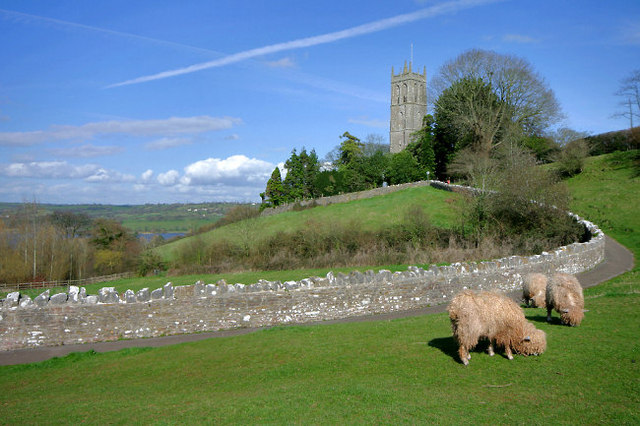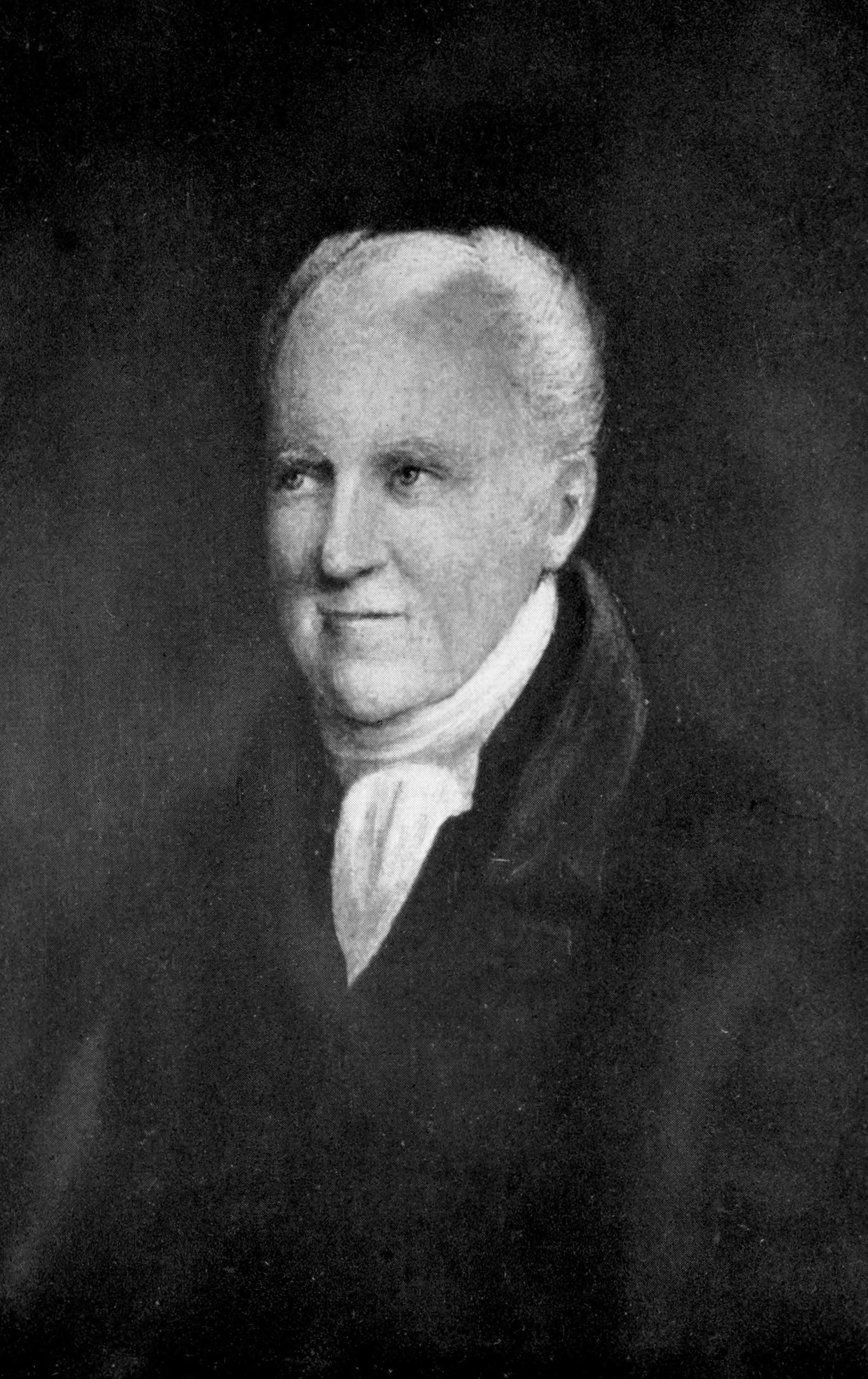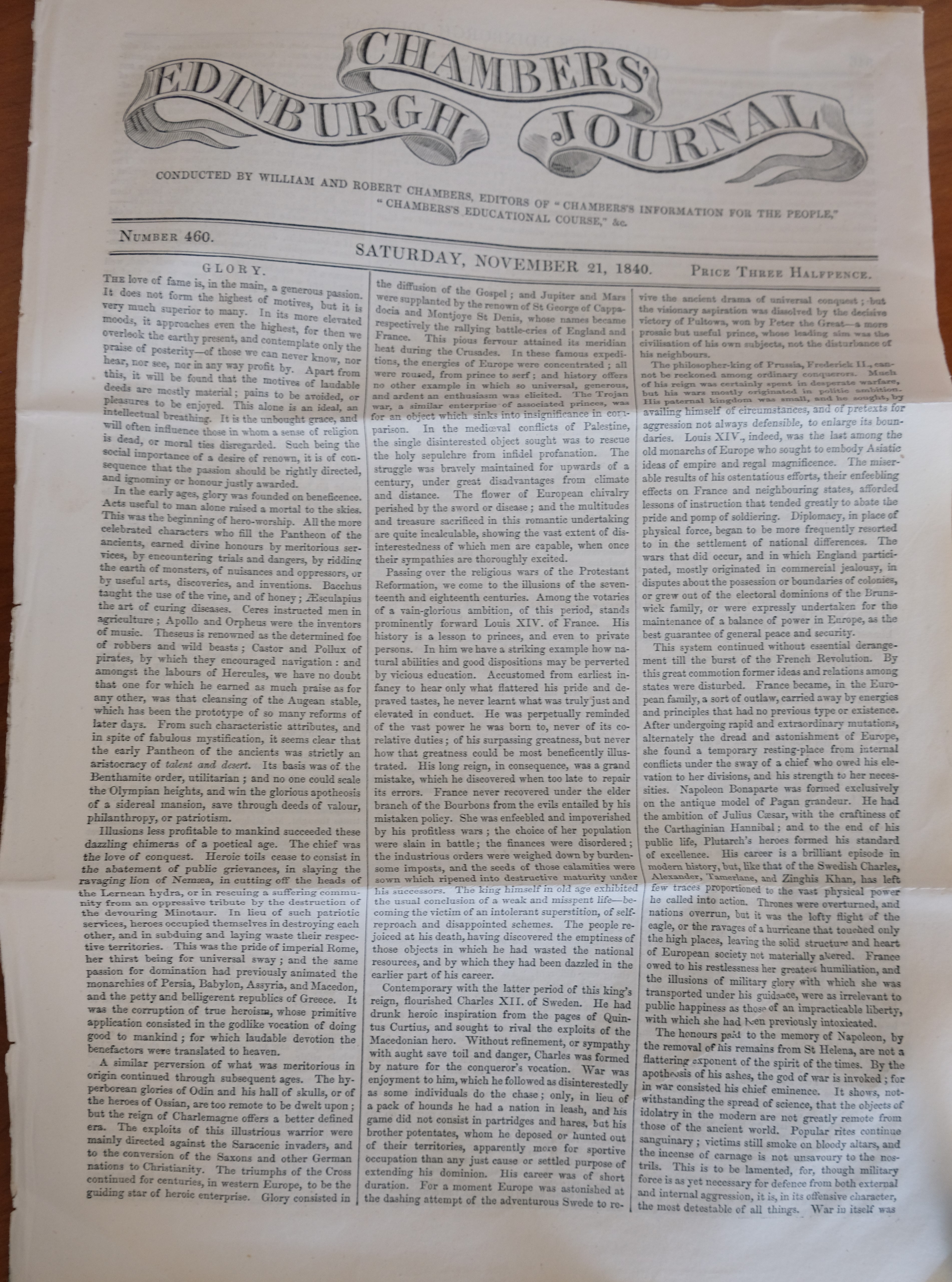|
John Langhorne (poet)
John Langhorne was an English clergyman, poet, translator, editor and author. He was born in March 1735 in Winton, a village in the former Westmorland, now the Eden District of Cumbria: ::In Eden's vale where early fancy wrought ::Her wild embroidery on the ground of thought. He died on 1 April 1779, in Blagdon, Somerset. Life John Langhorne's father was also a clergyman and died when his son was four. His mother made sure he had a school education, first in Winton village and then in Appleby, but there were not sufficient funds to send him to university. From the age of 18, he supported himself by teaching at various places in Yorkshire and finally was appointed tutor to the nine sons of Robert Cracroft at Hackthorn Hall in Lincolnshire. Having taken deacon's orders, he left in 1761 and, after a curate's appointment in Dagenham, became curate and lecturer at St. John's, Clerkenwell in 1764, and was appointed assistant preacher at Lincoln's Inn at the end of the following year. ... [...More Info...] [...Related Items...] OR: [Wikipedia] [Google] [Baidu] |
Clergyman
Clergy are formal leaders within established religions. Their roles and functions vary in different religious traditions, but usually involve presiding over specific rituals and teaching their religion's doctrines and practices. Some of the terms used for individual clergy are clergyman, clergywoman, clergyperson, churchman, and cleric, while clerk in holy orders has a long history but is rarely used. In Christianity, the specific names and roles of the clergy vary by denomination and there is a wide range of formal and informal clergy positions, including deacons, elders, priests, bishops, preachers, pastors, presbyters, ministers, and the pope. In Islam, a religious leader is often known formally or informally as an imam, caliph, qadi, mufti, mullah, muezzin, or ayatollah. In the Jewish tradition, a religious leader is often a rabbi (teacher) or hazzan (cantor). Etymology The word ''cleric'' comes from the ecclesiastical Latin ''Clericus'', for those belonging to t ... [...More Info...] [...Related Items...] OR: [Wikipedia] [Google] [Baidu] |
Prebendary
A prebendary is a member of the Roman Catholic or Anglican clergy, a form of canon with a role in the administration of a cathedral or collegiate church. When attending services, prebendaries sit in particular seats, usually at the back of the choir stalls, known as prebendal stalls. History At the time of the ''Domesday Book'' in 1086, the canons and dignitaries of the cathedrals of England were supported by the produce and other profits from the cathedral estates.. In the early 12th century, the endowed prebend was developed as an institution, in possession of which a cathedral official had a fixed and independent income. This made the cathedral canons independent of the bishop, and created posts that attracted the younger sons of the nobility. Part of the endowment was retained in a common fund, known in Latin as ''communia'', which was used to provide bread and money to a canon in residence in addition to the income from his prebend. Most prebends disappeared in 1547, ... [...More Info...] [...Related Items...] OR: [Wikipedia] [Google] [Baidu] |
18th-century English Poets
The 18th century lasted from January 1, 1701 ( MDCCI) to December 31, 1800 ( MDCCC). During the 18th century, elements of Enlightenment thinking culminated in the American, French, and Haitian Revolutions. During the century, slave trading and human trafficking expanded across the shores of the Atlantic, while declining in Russia, China, and Korea. Revolutions began to challenge the legitimacy of monarchical and aristocratic power structures, including the structures and beliefs that supported slavery. The Industrial Revolution began during mid-century, leading to radical changes in human society and the environment. Western historians have occasionally defined the 18th century otherwise for the purposes of their work. For example, the "short" 18th century may be defined as 1715–1789, denoting the period of time between the death of Louis XIV of France and the start of the French Revolution, with an emphasis on directly interconnected events. To historians who expan ... [...More Info...] [...Related Items...] OR: [Wikipedia] [Google] [Baidu] |
British Poets
British may refer to: Peoples, culture, and language * British people, nationals or natives of the United Kingdom, British Overseas Territories, and Crown Dependencies. ** Britishness, the British identity and common culture * British English, the English language as spoken and written in the United Kingdom or, more broadly, throughout the British Isles * Celtic Britons, an ancient ethno-linguistic group * Brittonic languages, a branch of the Insular Celtic language family (formerly called British) ** Common Brittonic, an ancient language Other uses *''Brit(ish)'', a 2018 memoir by Afua Hirsch *People or things associated with: ** Great Britain, an island ** United Kingdom, a sovereign state ** Kingdom of Great Britain (1707–1800) ** United Kingdom of Great Britain and Ireland (1801–1922) See also * Terminology of the British Isles * Alternative names for the British * English (other) * Britannic (other) * British Isles * Brit (other) * Briton (d ... [...More Info...] [...Related Items...] OR: [Wikipedia] [Google] [Baidu] |
Augustan Poetry
In Latin literature, Augustan poetry is the poetry that flourished during the reign of Caesar Augustus as Roman Emperor, Emperor of Rome, most notably including the works of Virgil, Horace, and Ovid. In English literature, Augustan poetry is a branch of Augustan literature, and refers to the poetry of the 18th century, specifically the first half of the century. The term comes most originally from a term that George I of Great Britain, George I had used for himself. He saw himself as an Augustus. Therefore, the British poets picked up that term as a way of referring to their endeavours, for it fit in another respect: 18th-century English poetry was political, satirical, and marked by the central philosophical problem of whether the individual or society took precedence as the subject of the verse. Overview In the British literary period known as the 'Augustan era,' poets were more conversant with each other's writings than were the contemporary novelists (see Augustan prose). ... [...More Info...] [...Related Items...] OR: [Wikipedia] [Google] [Baidu] |
Lines Written A Few Miles Above Tintern Abbey
''Lines Written a Few Miles above Tintern Abbey'' is a poem by William Wordsworth. The title, ''Lines Written'' (or ''Composed'') ''a Few Miles above Tintern Abbey, on Revisiting the Banks of the Wye during a Tour, July 13, 1798'', is often abbreviated simply to ''Tintern Abbey'', although that building does not appear within the poem. It was written by Wordsworth after a walking tour with his sister in this section of the Welsh Borders. The description of his encounters with the countryside on the banks of the River Wye grows into an outline of his general philosophy. There has been considerable debate about why evidence of the human presence in the landscape has been downplayed and in what way the poem fits within the 18th-century loco-descriptive genre. Background The poem has its roots in Wordsworth's personal history. He had previously visited the area as a troubled twenty-three-year-old in August 1793. Since then he had matured and his seminal poetical relationship wit ... [...More Info...] [...Related Items...] OR: [Wikipedia] [Google] [Baidu] |
George Crabbe
George Crabbe ( ; 24 December 1754 – 3 February 1832) was an English poet, surgeon and clergyman. He is best known for his early use of the realistic narrative form and his descriptions of middle and working-class life and people. In the 1770s, Crabbe began his career as a doctor's apprentice, later becoming a surgeon. In 1780, he travelled to London to make a living as a poet. After encountering serious financial difficulty and being unable to have his work published, he wrote to the statesman and author Edmund Burke for assistance. Burke was impressed enough by Crabbe's poems to promise to help him in any way he could. The two became close friends and Burke helped Crabbe greatly both in his literary career and in building a role within the church. Burke introduced Crabbe to the literary and artistic society of London, including Sir Joshua Reynolds and Samuel Johnson, who read '' The Village'' before its publication and made some minor changes. Burke secured Crabbe the impor ... [...More Info...] [...Related Items...] OR: [Wikipedia] [Google] [Baidu] |
Robert Chambers (publisher Born 1802)
Robert Chambers (; 10 July 1802 – 17 March 1871) was a Scottish publisher, geologist, evolutionary thinker, author and journal editor who, like his elder brother and business partner William Chambers, was highly influential in mid-19th-century scientific and political circles. Chambers was an early phrenologist in the Edinburgh Phrenological Society. He was also the anonymous author of ''Vestiges of the Natural History of Creation'', which was so controversial that his authorship was not acknowledged until after his death. Early life Chambers was born in Peebles in the Scottish Borders 10 July 1802 to Jean Gibson (''c''. 1781–1843) and James Chambers, a cotton manufacturer. He was their second son of six children. The town had changed little in centuries. The town had old and new parts, each consisting of little more than a single street. Peebles was mainly inhabited by weavers and labourers living in thatched cottages. His father, James Chambers, made his living as a cott ... [...More Info...] [...Related Items...] OR: [Wikipedia] [Google] [Baidu] |
The Oak And The Reed
The Oak and the Reed is one of Aesop's Fables and is numbered 70 in the Perry Index. It appears in many versions: in some it is with many reeds that the oak converses and in a late rewritten version it disputes with a willow. The story and its variants There are early Greek versions of this fable and a 5th-century Latin version by Avianus. They deal with the contrasting behaviour of the oak, which trusts in its strength to withstand the storm and is blown over, and the reed that 'bends with the wind' and so survives. Most early sources see it as a parable about pride and humility, providing advice on how to survive in turbulent times. This in turn gave rise to various proverbs such as 'Better bend than break' and 'A reed before the wind lives on, while mighty oaks do fall', the earliest occurrence of which is in Geoffrey Chaucer's ''Troilus and Criseyde'' (II.1387-9). It so happens that there is an overlap here with ancient Eastern proverbs. In its Chinese form, 'A tree that is u ... [...More Info...] [...Related Items...] OR: [Wikipedia] [Google] [Baidu] |
Aesop's Fables
Aesop's Fables, or the Aesopica, is a collection of fables credited to Aesop, a slave and storyteller believed to have lived in ancient Greece between 620 and 564 BCE. Of diverse origins, the stories associated with his name have descended to modern times through a number of sources and continue to be reinterpreted in different verbal registers and in popular as well as artistic media. The fables originally belonged to oral tradition and were not collected for some three centuries after Aesop's death. By that time, a variety of other stories, jokes and proverbs were being ascribed to him, although some of that material was from sources earlier than him or came from beyond the Greek cultural sphere. The process of inclusion has continued until the present, with some of the fables unrecorded before the Late Middle Ages and others arriving from outside Europe. The process is continuous and new stories are still being added to the Aesop corpus, even when they are demonstrably more ... [...More Info...] [...Related Items...] OR: [Wikipedia] [Google] [Baidu] |
Hugh Kelly (poet)
Hugh Kelly (1739 – 3 February 1777) was an Irish dramatist and poet. From the 1760s he was employed as a propagandist for the British government, attacking members of the Opposition. After arriving in London in 1760 to work as a staymaker, he soon turned to become a writer and made a living as a journalist. In 1766 he published ''Thespis'', a long poem about the acting profession, which gained him wide attention. He followed up this success with the novel '' Memoirs of a Magdalen'' in 1767. He ultimately became known for his stage plays such as ''False Delicacy'' and '' A Word to the Wise''. Early life The son of a Dublin publican, Hugh Kelly was born at Killarney, County Kerry. He enjoyed a reasonable education but was forced to drop out following his father's financial difficulties. He was apprenticed to a staymaker, and in 1760 went to London where he worked at his trade for some time, fairly unsuccessfully, and then became an attorney's clerk. He contributed to variou ... [...More Info...] [...Related Items...] OR: [Wikipedia] [Google] [Baidu] |
Charles Churchill (satirist)
Charles Churchill (February 1732 – 4 November 1764) was an English poet and satirist. Early life Churchill was born in Vine Street, Westminster. His father, Rev. Charles Churchill, was rector of Rainham, Essex, held the curacy and lectureship of St Johns, Westminster, from 1733, and Charles was educated at Westminster School, where he became a good classical scholar, and formed a close and lasting friendship with Robert Lloyd. He was admitted to St John's College, Cambridge on 8 July 1748. Churchill contracted a marriage with a Miss Scot within the rules of the Fleet in his eighteenth year, and never lived at Cambridge; the young couple lived in his father's house, and Churchill was afterwards sent to the north of England to prepare for holy orders. He became curate of the church of St Thomas à Becket in South Cadbury, Somerset, and, on receiving priest's orders (1756), began to act as his father's curate at Rainham. Two years later the elder Churchill died, and the son w ... [...More Info...] [...Related Items...] OR: [Wikipedia] [Google] [Baidu] |








_-_Foto_G._Dall'Orto_5_ago_2006.jpg)
